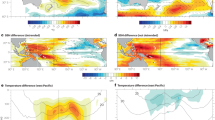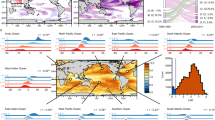Abstract
The study of large-scale correlations of atmospheric and oceanic variables on a supra-annual scale is essential for an understanding of climatic variability. We present here new data on the mean sea-level anomalies in the eastern Indian Ocean which are consistent with supra-annual anomalies in the intensity of the main oceanic gyre, and are negatively correlated with mean sea-level anomalies in the eastern Pacific Ocean. Larger anomalies are induced in the Indian Ocean probably due to its smaller size, and zonal mean stratospheric 50 mbar geopotential heights at 10°N, 20°N and 30°N are better correlated with the Indian Ocean than with the Pacific Ocean mean sea levels. It is speculated that the reported responses are due to a random variation of the monsoonally generated heat transport between the oceans. This variability would give rise to equatorial heat anomalies in each ocean which induce the observed changes in mean sea level, and the coupled changes in the sub-tropical atmospheric circulations.
This is a preview of subscription content, access via your institution
Access options
Subscribe to this journal
Receive 51 print issues and online access
$199.00 per year
only $3.90 per issue
Buy this article
- Purchase on SpringerLink
- Instant access to full article PDF
Prices may be subject to local taxes which are calculated during checkout
Similar content being viewed by others
References
Mean Sea Level Data Bank (The Flinders University of South Australia, Australia).
Enfield, D. B. & Allen, J. S. J. phys. Oceanogr. 10, 557–578 (1980).
Stommel, H. Trans. Am. geophys. Un. 29, 202–208 (1948).
Munk, W. H. J. Met. 7, 79–93 (1950).
Ramage, C. S. Monsoon Meteorology (Academic, New York, 1976).
Koopmans, L. H. The Spectral Analysis of Time Series (Academic, New York, 1974).
Wyrtki, K. J. phys. Oceanogr. 5, 572–583 (1975).
Wyrtki, K. J. phys. Oceanogr. 7, 779–787 (1977).
Wyrtki, K. J. phys. Oceanogr. 9, 1223–1231 (1979).
Meyers, G. & White, W. Ocean Model. 23, 1–2 (1979).
Bye, J. A. T. & Veronis, G. J. phys. Oceanogr. 9, 649–651 (1979).
Needler, G. Deep Sea Res. 18, 895–903 (1972).
Proudman, J. Dynamical Oceanography (Methuen, London, 1953).
Kondo, J. Bound. Lay. Met. 9, 91–112 (1975).
Kidson, E. Bull. Bur. Met. Cmmwth Australia 17 (1925).
Wright, P. B. Hawaii Inst. Geophys. 13 (1977).
Stratospheric Data Bank (Free University of Berlin).
Gordon, A. H. Proc. Conf. Meteorology over the Tropical Oceans (Royal Meteorological Society, London, 1979).
Joseph, P. V. Ind. met. Dept (Poona) Sci. Rep. 23 (1975).
Van Loon, H. & Madden, R. A. Mon. Weath. Rev. 109, 1150–1162 (1981).
Permanent Service for Mean Sea Level (Bidston Observatory, Birkenhead).
Author information
Authors and Affiliations
Rights and permissions
About this article
Cite this article
Bye, J., Gordon, A. Speculated cause of interhemispheric oceanic oscillation. Nature 296, 52–54 (1982). https://doi.org/10.1038/296052a0
Received:
Accepted:
Issue date:
DOI: https://doi.org/10.1038/296052a0



